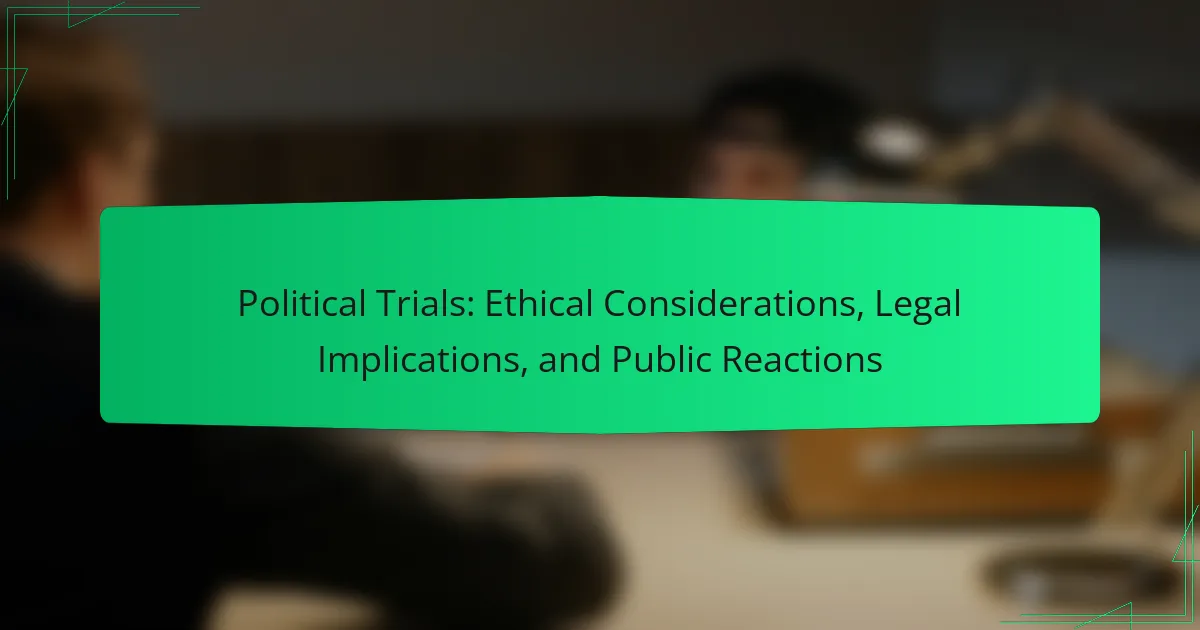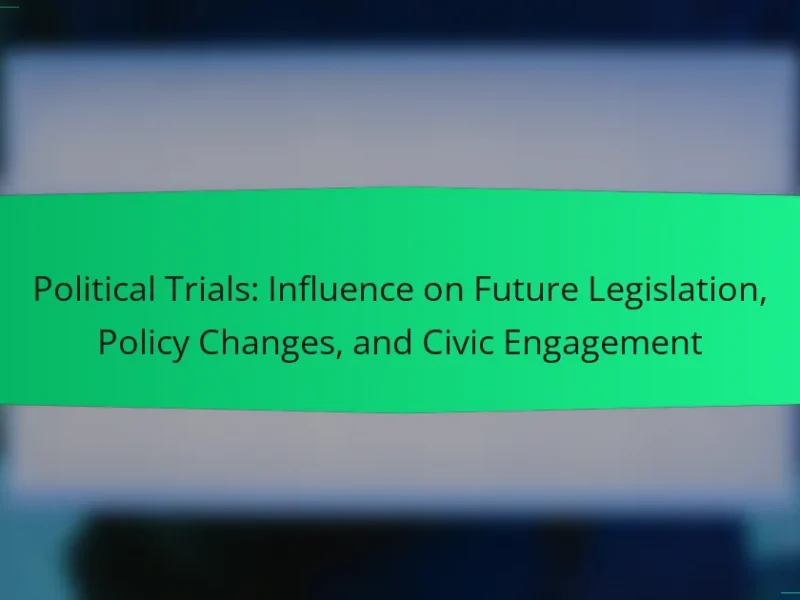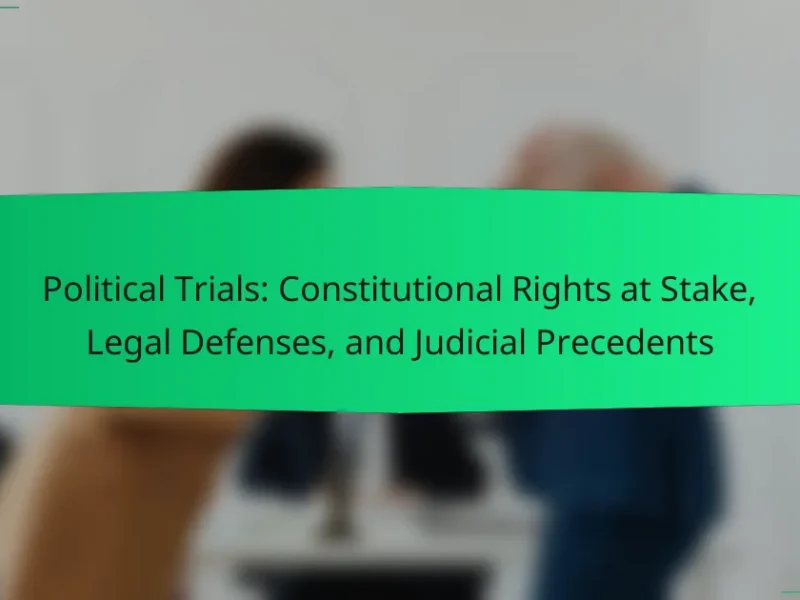Political trials are judicial proceedings driven by political motives rather than legal standards, often involving prominent figures like politicians and activists. These trials can suppress dissent and consolidate power, frequently lacking impartiality and adherence to standard legal practices. Ethical considerations include fairness, impartiality, and the potential for bias, which can influence judicial outcomes and public trust. The legal implications of political trials challenge due process and fair trial rights, potentially undermining the rule of law. Public reactions to these trials are complex, shaped by the political climate and media coverage, reflecting a spectrum of opinions on justice and accountability.
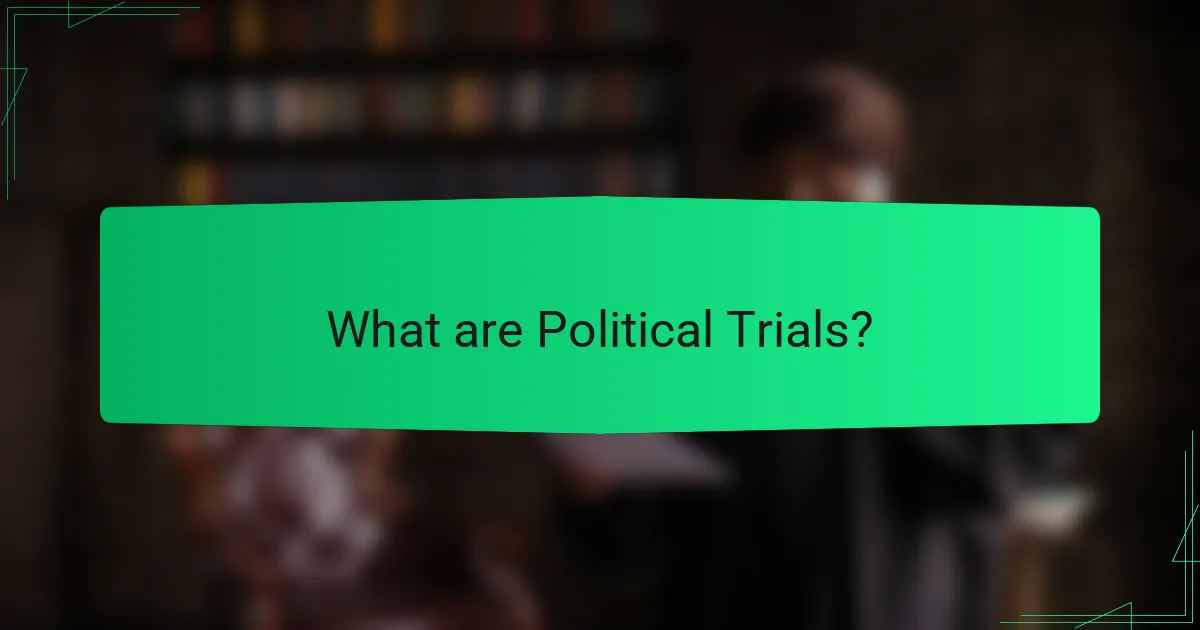
What are Political Trials?
Political trials are judicial proceedings that are primarily motivated by political considerations rather than legal ones. These trials often involve high-profile figures, such as politicians or activists. They can be used to suppress dissent or consolidate power. Political trials may lack impartiality and may not adhere to standard legal practices. Historical examples include the trials of political dissidents in authoritarian regimes. Such trials raise ethical concerns regarding justice and fairness. They often attract significant public attention and can influence public opinion. The implications of political trials extend to the legitimacy of legal systems and governance.
How do Political Trials differ from Regular Trials?
Political trials differ from regular trials primarily in their context and implications. Political trials often involve government officials or politically charged issues. They may be influenced by public opinion and political agendas. Regular trials typically focus on individual disputes or crimes without broader political implications. Political trials can lead to significant social unrest or changes in governance. Historical examples include the trial of former President Andrew Johnson in 1868. This trial was deeply intertwined with the political landscape of Reconstruction. In contrast, regular trials like those for theft or assault are more straightforward and less likely to influence national policy.
What unique characteristics define Political Trials?
Political trials are characterized by their focus on political issues rather than criminal behavior. They often involve defendants who are political figures or activists. The proceedings may lack impartiality, influenced by governmental or political pressures. Political trials frequently attract significant media attention and public scrutiny. They can serve as a tool for political repression or to delegitimize opposition. The legal standards applied may differ from those in standard criminal trials. These trials often raise ethical concerns regarding fairness and justice. Historical examples include the trials of political dissidents in authoritarian regimes.
In what contexts do Political Trials typically occur?
Political trials typically occur in contexts where the state prosecutes individuals for actions deemed threatening to political stability. These trials often arise during periods of political unrest or regime change. They can also occur in authoritarian regimes to suppress dissent and maintain control. Historical examples include the Nuremberg Trials following World War II. Additionally, political trials may take place in democracies during election cycles or in response to corruption scandals. In such cases, the legal system is used to address alleged misconduct by public officials. The motivations behind these trials can vary, including the desire to deter opposition or to legitimize government actions.
Why are Political Trials significant in society?
Political trials are significant in society because they address issues of justice and accountability. They often involve high-profile figures, which can influence public perception of the legal system. Political trials can reveal systemic corruption or abuse of power. They serve as a platform for public discourse on governance and ethics. Historical examples, like the Nuremberg Trials, showcase their role in establishing international law. Additionally, political trials can mobilize social movements and bring about reform. They highlight the intersection of law and politics, impacting societal norms and values. Overall, political trials are a critical mechanism for societal change and reflection.
What impact do Political Trials have on public perception of justice?
Political trials significantly influence public perception of justice. They often raise concerns about fairness and impartiality in legal processes. High-profile cases can polarize public opinion. People may view political trials as tools for oppression or as necessary actions for accountability. The media plays a crucial role in shaping these perceptions. Coverage can either reinforce or challenge the legitimacy of the trial. Historical examples, such as the trial of former President Donald Trump, illustrate how political context affects public trust in judicial outcomes. As a result, political trials can either enhance or diminish the perceived integrity of the justice system.
How do Political Trials influence political landscapes?
Political trials significantly influence political landscapes by shaping public opinion and altering power dynamics. They can expose corruption and lead to the downfall of political figures. For example, the Watergate scandal resulted in President Nixon’s resignation, demonstrating how trials can shift political power. Additionally, political trials often mobilize public protests and activism. This can lead to increased political engagement among citizens. Historical cases show that political trials can redefine party loyalties and voter behavior. The outcome of such trials can also impact legislation and policy-making. Overall, political trials serve as pivotal events that can reshape a nation’s political framework.
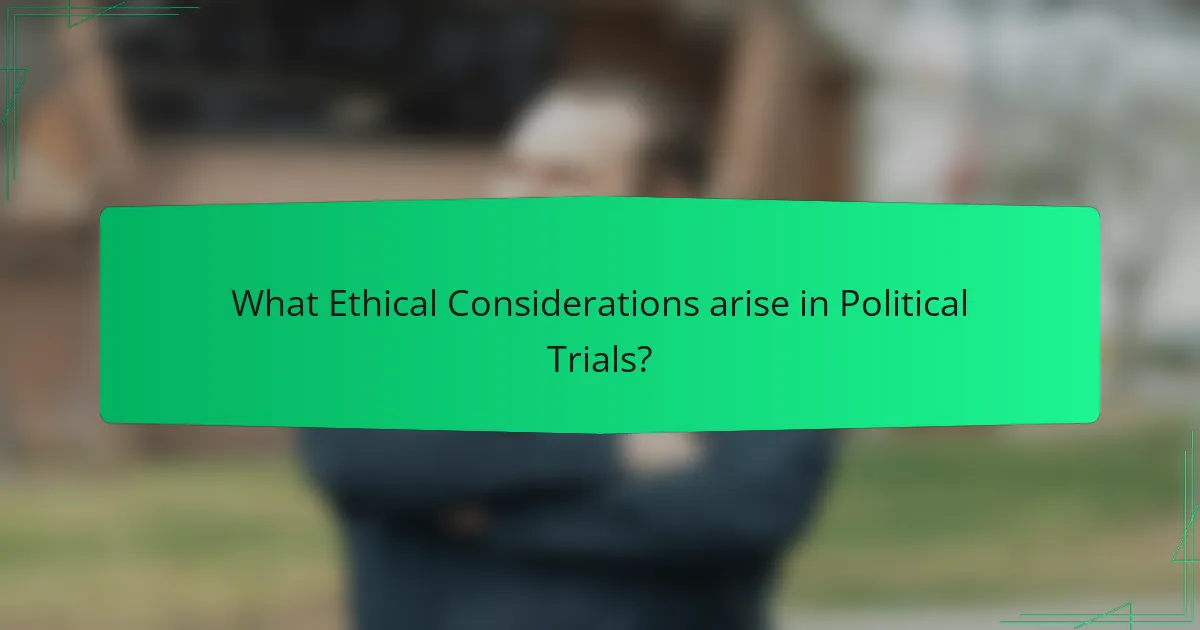
What Ethical Considerations arise in Political Trials?
Ethical considerations in political trials include fairness, impartiality, and the potential for bias. Fairness ensures all parties receive equal treatment under the law. Impartiality is crucial to prevent influence from political affiliations. Bias can arise from media coverage and public opinion, affecting judicial outcomes. The presumption of innocence must be upheld to protect defendants’ rights. Transparency in proceedings is essential to maintain public trust. Additionally, the potential for political manipulation raises concerns about the integrity of the judicial process. Historical examples, such as the trials of political dissidents, illustrate these ethical dilemmas.
How do ethical dilemmas manifest in Political Trials?
Ethical dilemmas in political trials manifest through conflicting interests, justice, and public perception. These trials often involve high-profile individuals whose actions are scrutinized. Legal representatives may face pressure to prioritize political gains over ethical standards. Judges must balance impartiality with societal expectations. The media’s role can influence public opinion, complicating the perception of fairness. Historical examples include the trials of political figures like Richard Nixon, where ethical questions about accountability arose. Such dilemmas highlight the tension between legal proceedings and ethical conduct in the political arena.
What are some common ethical challenges faced by judges and jurors?
Judges and jurors face several common ethical challenges. One challenge is maintaining impartiality during trials. Judges must avoid biases that could influence their rulings. Jurors also need to set aside personal beliefs to ensure fair deliberation. Another challenge is managing conflicts of interest. Judges may encounter cases involving personal connections or prior knowledge. Jurors might face similar issues if they know parties involved in the case. A further challenge is addressing external pressures. Judges may experience public scrutiny or media influence on their decisions. Jurors can feel societal pressure to conform to popular opinion. Lastly, upholding confidentiality is crucial. Judges must protect sensitive information shared during trials. Jurors are also required to keep discussions private until the trial concludes. These ethical challenges are critical for maintaining the integrity of the judicial process.
How can bias affect the outcomes of Political Trials?
Bias can significantly affect the outcomes of political trials by influencing juror perceptions and judicial decisions. It can lead to unfair advantages for one party over another. For example, pre-trial publicity may shape public opinion and juror biases before the trial begins. This can result in jurors making decisions based on emotions rather than facts. Furthermore, systemic biases related to race, gender, or political affiliation can skew trial outcomes. Research shows that biased jurors are more likely to convict defendants from marginalized groups. Studies indicate that bias can undermine the fairness of trials, leading to wrongful convictions or acquittals. Overall, bias threatens the integrity of the judicial process in political trials.
What role does public opinion play in the ethics of Political Trials?
Public opinion significantly influences the ethics of political trials. It shapes perceptions of fairness and justice. When the public is engaged, it can lead to increased scrutiny of trial processes. This scrutiny can pressure legal systems to uphold ethical standards. Historical examples show that public outcry can affect trial outcomes. The trial of O.J. Simpson highlighted how media and public sentiment can sway perceptions. Ethical dilemmas arise when public opinion conflicts with legal principles. Ultimately, public opinion serves as a barometer for societal values in political trials.
How does media coverage influence public perception of Political Trials?
Media coverage significantly influences public perception of political trials. It shapes narratives surrounding the trial, often framing the accused and the charges in specific ways. For instance, sensational reporting can lead to heightened public scrutiny and bias against defendants. Conversely, balanced coverage may promote a more nuanced understanding of the legal proceedings. Studies show that media portrayal can affect jury selection and verdict outcomes. According to research by the Pew Research Center, 63% of Americans believe media coverage affects the fairness of trials. This demonstrates the profound impact media has on public opinion and the judicial process.
What are the ethical implications of public protests related to Political Trials?
Public protests related to political trials raise significant ethical implications. They can challenge the legitimacy of judicial processes. Protests may influence public opinion and potentially sway legal outcomes. This creates concerns about the fairness of trials. Ethical dilemmas arise regarding freedom of speech versus potential mob mentality. There is a risk of undermining the rule of law. Public protests can also lead to polarization within society. This polarization may affect the social fabric and democratic discourse. Overall, the ethical implications of such protests are complex and multifaceted.
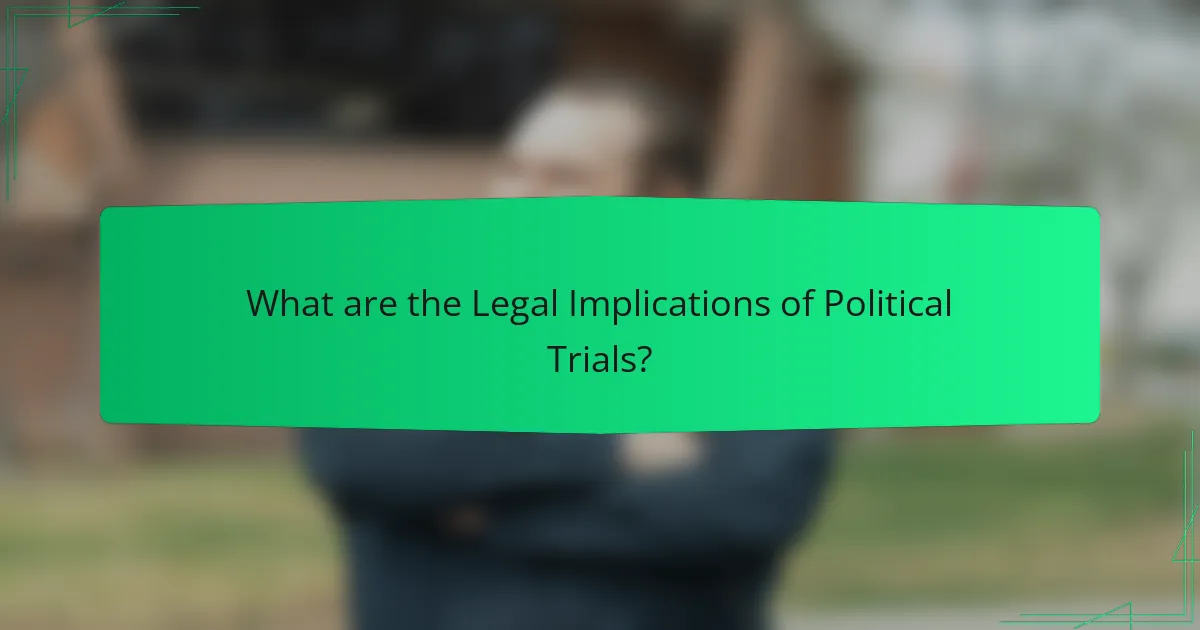
What are the Legal Implications of Political Trials?
Political trials can have significant legal implications, affecting both the judicial process and the rights of individuals involved. These trials often challenge the principles of due process and fair trial rights. They may lead to biased judgments influenced by political agendas. Additionally, political trials can result in the erosion of public trust in the legal system. Historical examples include the trials of political dissidents under authoritarian regimes, which often violate international human rights standards. Legal frameworks may be manipulated to serve political ends, undermining the rule of law. Furthermore, the outcomes of political trials can set precedents that impact future legal proceedings.
What legal frameworks govern Political Trials?
Political trials are governed by a combination of domestic laws, international human rights standards, and constitutional provisions. Domestic laws include criminal codes and procedures that outline the conduct of trials. International standards, such as the International Covenant on Civil and Political Rights, set guidelines for fair trial rights. Constitutional provisions often guarantee due process and the right to a fair hearing. These frameworks aim to ensure justice and protect individual rights during politically charged cases. Historical examples, such as the Nuremberg Trials, highlight the application of these legal standards in political contexts.
How do constitutional rights apply in the context of Political Trials?
Constitutional rights are fundamental protections that apply during political trials. These rights ensure fair treatment and due process for defendants. The First Amendment guarantees freedom of speech and assembly, which can impact the trial’s environment. The Sixth Amendment ensures the right to a fair trial, including an impartial jury and legal representation. The Fourteenth Amendment provides equal protection under the law, preventing discrimination in judicial proceedings. Historical cases, such as the trial of political dissidents, illustrate these rights in action. Courts often scrutinize political trials to uphold constitutional protections. Violations of these rights can lead to appeals and retrials.
What precedents have been set by notable Political Trials?
Notable political trials have set significant precedents in legal and ethical frameworks. They often highlight the balance between state authority and individual rights. For instance, the trial of Socrates established the principle of free speech and the importance of dissent in a democratic society. The Nuremberg Trials established accountability for war crimes, reinforcing the idea that individuals can be held responsible for actions taken under government orders. The impeachment trials of U.S. presidents, such as Andrew Johnson and Bill Clinton, have clarified the constitutional grounds for impeachment, emphasizing the role of checks and balances. These trials illustrate the evolving nature of justice and governance, influencing future legal standards and societal norms.
How do Political Trials affect international law and relations?
Political trials can significantly influence international law and relations. They often raise questions about human rights and the rule of law. These trials can lead to international scrutiny and condemnation. For example, high-profile cases may result in sanctions or diplomatic isolation. Political trials can also affect treaties and international agreements. They may lead to calls for accountability and reform in governance. Additionally, such trials can impact bilateral relations between countries involved. Historical instances, like the Nuremberg Trials, reshaped international law regarding war crimes.
What are the implications of Political Trials on human rights issues?
Political trials can severely impact human rights issues. They often lead to the suppression of dissent and the violation of fair trial rights. Individuals may face arbitrary detention without due process. Political motivations can overshadow legal principles, compromising justice. Such trials can instill fear in society, discouraging free expression. Historical examples include the trials during authoritarian regimes, which often resulted in human rights abuses. The United Nations has documented cases where political trials undermined fundamental freedoms. Thus, political trials frequently pose significant threats to human rights standards globally.
How can Political Trials influence diplomatic relations between countries?
Political trials can significantly influence diplomatic relations between countries. They often lead to tensions or conflicts when one nation perceives another’s judicial actions as politically motivated. For example, high-profile cases can provoke international criticism or sanctions. This can result in a deterioration of bilateral relations. Conversely, political trials may also lead to diplomatic negotiations aimed at resolving disputes. Historical instances show that political trials can alter alliances and affect trade agreements, as seen during the Nuremberg Trials. These trials shaped post-World War II diplomacy. Therefore, the outcomes of political trials can have far-reaching consequences on international relations.
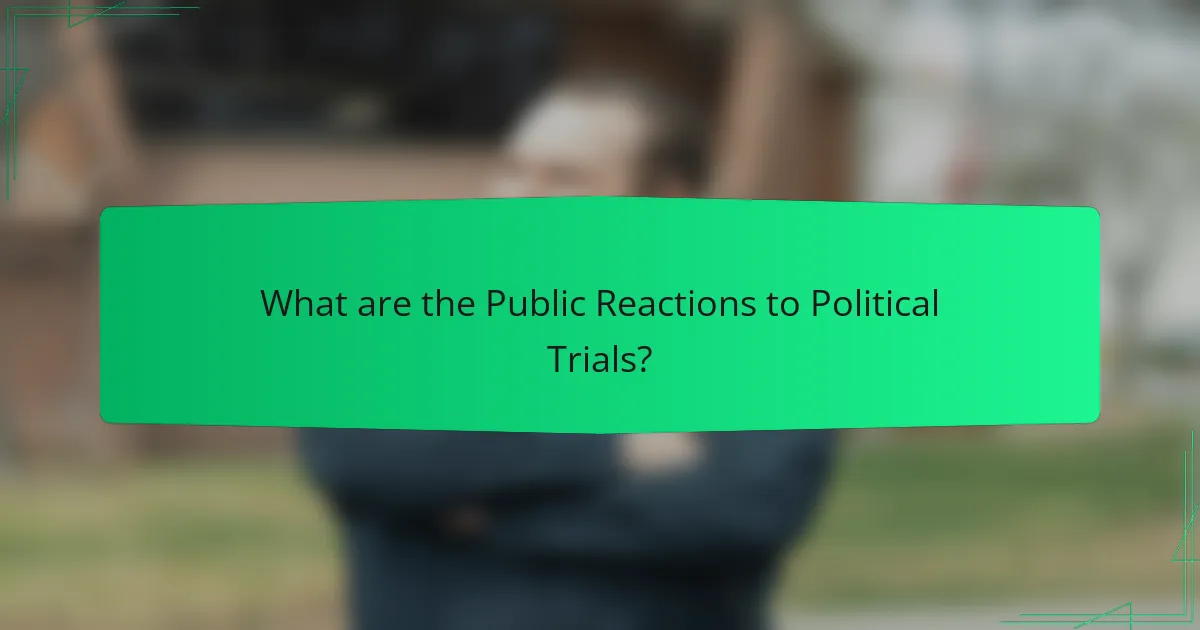
What are the Public Reactions to Political Trials?
Public reactions to political trials vary widely. They often reflect the political climate and public sentiment. Supporters of the trials may view them as necessary for justice and accountability. They believe that holding political figures accountable is crucial for democracy. Conversely, opponents may see these trials as politically motivated or unjust. They argue that such trials undermine the rule of law. Public opinion can be influenced by media coverage and political affiliations. For instance, during high-profile trials, social media often amplifies polarized views. Historical examples, such as the impeachment trials in the United States, show significant public engagement and debate. Overall, public reactions to political trials are complex and multifaceted.
How do different demographics react to Political Trials?
Different demographics react to political trials in varied ways based on factors such as age, education, and political affiliation. Younger individuals often show more skepticism towards political trials, viewing them as politically motivated. In contrast, older demographics may trust the judicial process more, believing in its integrity.
Education levels also influence reactions. Individuals with higher education tend to critically analyze the motives behind political trials. They may question the fairness of proceedings and the implications of political influence. Conversely, those with lower educational attainment may accept the outcomes more readily, often influenced by media narratives.
Political affiliation plays a significant role as well. Supporters of the accused often perceive trials as unjust, while opponents may view them as necessary for accountability. This division can lead to polarized public opinion, reflecting broader societal divides.
Surveys have shown that demographic factors significantly impact perceptions of political trials, highlighting the complex interplay between personal background and political beliefs.
What factors influence varying public reactions to Political Trials?
Public reactions to political trials are influenced by several factors. Key factors include media coverage, public perception of justice, and political context. Media coverage shapes narratives and can sway public opinion significantly. The perceived fairness of the trial affects how the public views its legitimacy. Political context, such as the trial’s timing in relation to elections or political unrest, also plays a crucial role. Historical precedents of similar trials can inform public expectations and reactions. Additionally, the involvement of influential political figures can polarize opinions. Social media dynamics further amplify these reactions, allowing rapid dissemination of opinions and information.
How do cultural contexts shape public responses to Political Trials?
Cultural contexts significantly influence public responses to political trials. Different societies have varying values, beliefs, and historical experiences that shape their perceptions of justice and authority. For instance, in collectivist cultures, public opinion may favor community harmony over individual rights during trials. Conversely, in individualistic cultures, there is often a stronger emphasis on personal freedoms and due process.
Historical experiences with authority also play a crucial role. In nations with a history of political oppression, public skepticism towards trials may arise. Citizens might view trials as tools of political repression rather than impartial justice. In contrast, societies with a strong tradition of judicial independence may respond more positively to political trials.
Additionally, media portrayal of political trials can vary by culture, further influencing public perception. In some cultures, state-controlled media may present biased narratives that shape public opinion. In others, independent media can foster critical discourse and diverse viewpoints.
Research indicates that cultural dimensions, such as those identified by Hofstede, affect how societies interpret legal proceedings. For example, cultures with high uncertainty avoidance may demand more transparency and procedural fairness in trials. This demonstrates that cultural contexts are integral to understanding public reactions to political trials.
What are the consequences of public reactions to Political Trials?
Public reactions to political trials can significantly influence the legal outcomes and societal perceptions of justice. These reactions often lead to increased scrutiny of the judicial process. Public outcry can pressure legal authorities to act in ways that align with popular sentiment. This can result in heightened media coverage, shaping public opinion further. For example, the trial of former Illinois Governor Rod Blagojevich drew national attention and public opinion influenced perceptions of his guilt. Additionally, public reactions can mobilize political movements, either supporting or opposing the trial’s subjects. This can lead to protests or advocacy campaigns, impacting political landscapes. Ultimately, public reactions can affect the legitimacy of the judicial system and its perceived fairness.
How can public backlash affect the judicial process in Political Trials?
Public backlash can significantly influence the judicial process in political trials. It may lead to heightened scrutiny of judicial decisions. Judges might feel pressured to align their rulings with public sentiment. This pressure can compromise judicial independence and impartiality. Public opinion can also sway jury decisions in politically charged cases. For example, high-profile trials often see jurors influenced by media coverage and public discourse. Furthermore, public backlash can result in calls for legal reforms or changes in trial procedures. Historical instances, like the trial of former President Andrew Johnson, illustrate how public sentiment can reshape judicial outcomes.
What role do social movements play in shaping the narrative around Political Trials?
Social movements significantly influence the narrative surrounding political trials. They mobilize public opinion and shape perceptions of justice and fairness. Social movements often highlight perceived injustices in political trials. This can lead to increased media coverage and public discourse. For example, movements like Black Lives Matter have impacted trials related to police misconduct. They bring attention to systemic issues, framing the trials within broader social contexts. Additionally, social movements can pressure legal systems for accountability. This can result in changes to laws or policies regarding political trials. Overall, social movements act as catalysts for change in the narrative of political trials.
What can be learned from analyzing Political Trials?
Analyzing political trials reveals insights into the intersection of law and politics. These trials often highlight the ethical dilemmas faced by legal systems. They can demonstrate how political power influences judicial outcomes. Historical examples, such as the Nuremberg Trials, showcase accountability for war crimes. Political trials can also reflect societal values and public opinion during pivotal moments. Additionally, they provide a framework for understanding legal precedents in politically charged cases. The outcomes can influence future legislation and political discourse. Overall, studying these trials enhances comprehension of governance and justice.
How can understanding Political Trials improve future legal practices?
Understanding political trials can enhance future legal practices by providing insights into the intersection of law and politics. Analyzing past political trials reveals patterns of judicial behavior and decision-making. This knowledge can inform legal strategies and improve the handling of politically charged cases. Historical examples, such as the Nuremberg Trials, illustrate how legal frameworks adapt to address political contexts. Additionally, understanding public perceptions during political trials can guide lawyers in managing media and public relations. The impact of political trials on legislation can also shape future legal standards and practices. Overall, the study of political trials contributes to a more nuanced understanding of legal processes in politically sensitive environments.
What best practices can emerge from the study of Political Trials?
Best practices that can emerge from the study of Political Trials include ensuring transparency in legal proceedings. Transparency fosters public trust and accountability. Implementing fair trial standards is crucial. Fair trials uphold the rights of defendants and maintain judicial integrity. Regular training for legal professionals on political sensitivity can enhance understanding. This training helps navigate the complexities of political contexts. Engaging civil society in monitoring trials promotes oversight. Civil society involvement can deter potential abuses and ensure adherence to human rights. Lastly, documenting and analyzing outcomes of political trials contributes to legal reforms. This documentation provides valuable insights for future cases and promotes justice.
Political trials are judicial proceedings driven by political motivations, often involving high-profile figures and raising significant ethical and legal concerns. This article examines the unique characteristics of political trials, their differences from regular trials, and the contexts in which they occur. It discusses the implications of these trials on public perception of justice, the influence of media and public opinion, and the potential for bias in judicial outcomes. Additionally, the article explores the legal frameworks governing political trials and their impact on human rights and international relations, highlighting the consequences of public reactions and the role of social movements in shaping narratives around these trials.
